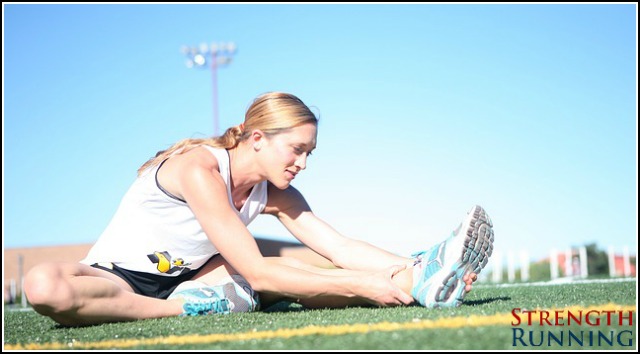We’re discussing the sensitive but important topic of eating disorders in runners today with my guest, Annyck Besso, RD. It’s one that needs more oxygen and air – and I hope you’ll join the conversation.

A reality of distance running is that the sport favors a particular body type. Like wrestling, gymnastics, or football (any sport, really), certain body types are more favored for different physical tasks.
Just look at the Sports Illustrated Body Issue and you’ll see (naked) Olympians of all sports talking about their relationship with their bodies.
It’s a fascinating read on how elite athletes think about their appearance, strength, diet, and the challenges they face regarding their body.
But of course, just because a certain body type is favored does not mean we should strive for a one-size-fits-all mold of how we should look. We’re all unique – and that doesn’t mean we can’t be successful runners.
Many runners develop eating disorders as a way to chase this body type. An important piece in the Washington Post notes:
Weight… is only one of about 40 factors in sport performance, but there is an underlying belief among runners that lighter means faster.
And while a correlation between body weight and speed exists… this can be a slippery slope toward an eating disorder and that any improvements in time, however brief, can negatively reinforce destructive behaviors.
Most coaches – including myself – don’t have the tools to discuss this serious issue. I have no personal experience or training with eating disorders in runners (though I have friends with disordered eating).
So I brought on someone who does: Annyck Besso.
Annyck Besso on Eating Disorders in Runners

The goals of this conversation are threefold:
- Give coaches better tools to educate, help, and guide their runners with eating disorders
- Open a dialogue among all runners and foster a healthy, productive conversation
- Provide resources to those who might be suffering from any type of disordered eating
Annyck is a Registered Dietitian with expertise in the treatment of eating disorders in private and academic medical center environments. She has a Bachelors degree in nutrition and dietetics, a Master’s degree in dietetics, and specialty training in approaches like Cognitive Behavioral Therapy (CBT), Family Based Treatment (FBT), and Dialectical Behavioral Therapy (DBT).
She’s also quite the speedy runner, recently running 3:07 at the hot and humid Wisconsin Marathon.
Subscribe to the podcast on Apple Podcasts or on the Stitcher App.
Resources & Links from the show:
- The Recovery Record app
- Mind Body Health (Annyck’s practice)
- Division of Responsibility Feeding
- National Eating Disorders Association Helpline
- FBT approach for treating eating disorders
- Recommended book: Nourishing Wisdom by Marc David
- Recommended book: Intuitive Eating by Evelyn Tribole and Elyse Resch
- Recommended book (for parents): Anorexia and Other Eating Disorders by Eva Musby
- Strength Running’s free nutrition series
Thank you Annyck for coming on the podcast to share your expertise about the topic of eating disorders in runners. There are a lot of resources included that I hope all of our listeners will find helpful!
Thank You Inside Tracker
This episode was made possible by Inside Tracker who is offering a 10% discount with code strengthrunning at checkout.
They test over 40 biomarkers, like various stress hormones, to determine if you’re training too hard, too little, or have any physiological weaknesses that can be remedied by either diet, exercise, or lifestyle changes.
In other words, you learn about problems that have actionable solutions.
After getting your results, they communicate what you can do to lift or lower your results into the optimal range. For any runner who wants every advantage, to see what they’re truly capable of achieving, I highly recommend Inside Tracker.
Don’t forget to use code strengthrunning to save 10% on any test (including their affordable DIY and Essentials)!